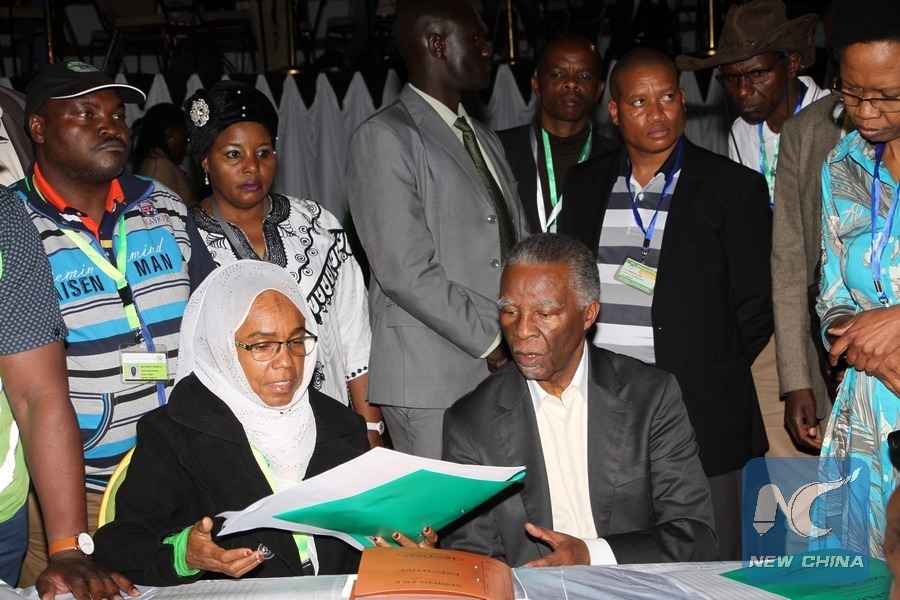
Women cast their votes in Kenya's repeat presidential polls at a polling station in Nairobi, Kenya, Oct. 26, 2017. (Xinhua/Chen Cheng)
NAIROBI, Nov. 1 (Xinhua) -- African and European election observers have called on Kenya's leaders to engage in dialogue to resolve the political impasse following a controversial presidential re-run last week.
In respective statements, the African Union (AU), the European Union (EU) and the Intergovernmental Authority on Development (IGAD), an eight-country East Africa bloc, made the appeal after incumbent President Uhuru Kenyatta was announced as the winner.
The AU observer mission gave a positive assessment of the repeat presidential polls, but urged political players to engage in dialogue to heal the country from polarization.

Independent Electoral and Boundaries Commission (IEBC) verification officer Aisha Mohammed (L, Front) shows the process of verifying forms 34 A and 34 B to Thabo Mbeki, head of African Union elections observer team to Kenyan at the National Tally Centre in Bomas of Kenya, Nairobi, Kenya, Oct. 29, 2017. Voting in Kenya's repeat presidential polls began on Thursday as some polling stations, mainly in opposition strongholds, reported disruptions and low voter turnout. (Xinhua/Allan Mutiso)
"Overall, the stipulated procedures for opening, voting, closing and counting were largely complied with," the statement said. "The AU observer mission noted improvements in the technical conduct of the elections."
Former South African President Thabo Mbeki led the AU team that observed Kenya's repeat presidential polls that were characterized by low voter turnout, protests and boycotts in opposition strongholds.
The AU deployed observers to 20 counties during the Oct. 26 repeat presidential election.
In its statement, the EU observer mission stressed that "More than ever there is a need in Kenya for political leaders to take up their responsibility and find a way out of the impasse through direct talks at the highest level."
"Grievances over the electoral processes should be addressed through judicial channels for legally-mandated remedy. The courts and the Independent Electoral and Boundaries Commission (IEBC) be given full opportunity to work independently and without undue pressure," the EU observers said.
Despite these problems, polling and counting appeared to be generally well administered and some technical improvements were evident in the results process although further assessment is still needed, they said.

Kenyan President Uhuru Kenyatta (R, front) receives the certificate as the winner of the repeat presidential election from Independent Electoral and Boundary Commission (IEBC) chairman Wafula Chabukati in Nairobi, capital of Kenya, Oct. 30, 2017. Kenya's Uhuru Kenyatta won the repeat presidential elections boycotted by opposition, garnering 98.2 percent of the vote cast, Kenya's electoral body said on Monday.(Xinhua/Charles Onyango)
EU Chief Observer Marietje Schaake said actions by rival sides have put Kenya in an extremely difficult position.
"These include attacks on the judiciary as well as the IEBC, the introduction of changes to the legal framework without consensus, obstruction of the electoral process and officials, and some disproportionate actions by the security forces," Schaake said.
Meanwhile, IGAD observers commended Kenya for conducting a transparent repeat presidential polls on Oct. 26 and urged political leaders to promote national healing after the divisive electioneering season.
The bloc said that the voting exercise was largely peaceful and transparent in the 79 polling stations within Nairobi where its observers were deployed.
"Most polling centers and stations opened on time and were laid out in an orderly manner. Our observers had free access to the polling centers and election materials were adequately distributed," said the bloc.

National Super Alliance (NASA) leader Raila Odinga addresses his supporters at Uhuru Park in Nairobi, capital of Kenya, Oct. 25, 2017. Kenya's main opposition alliance said on Wednesday that it will transform itself into a national resistance movement. (Xinhua/Nyalwash)
The regional bloc deployed a team of 21 observers to Kenya who met key stakeholders to gauge the country's preparedness to hold a repeat presidential election.
IEBC chairman Wafula Chebukati on Thursday announced Kenyatta as the winner after he garnered 98.3 percent of the total votes cast, against his National Super Alliance (NASA) rival Raila Odinga's 1 percent.

